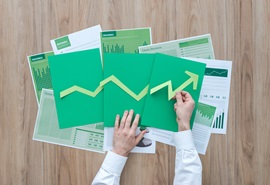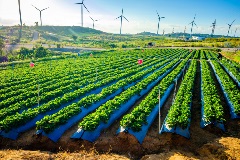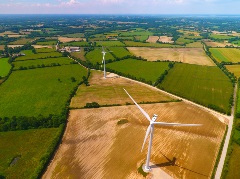Sustainable Finance Insights on Transition Finance, Sustainability-Linked Bonds, Sovereign Bonds and More
In this episode, we discuss ongoing diversification in the labeled bond market and highlight developments around transition finance guidance as well as new and updated principles in the loan market.
Bringing Investors and Companies Together to Address the Climate Change Crisis
As Earth Day is around the corner on the 22nd of April, the Biden Administration is to convene a global climate summit. Following a historical precedent for several such events, since its inception in 1970, including signing the landmark Paris Agreement . We have seen positive developments since the Paris Agreement; societal actions to address some of the root causes of climate change have yet to suppress the negative trends . Historically, active ownership on climate change has focused on direct emissions from highly exposed sectors, such as fossil fuel and utility companies. However, the more complicated, less direct aspects of climate change have seen limited progress. Tackling such issues will see a strong need for collaboration from both countries and other key sectors, in particular, banking and finance. Banks are key to support this transformation; facilitating economic activity for positive change throughout the entire value chain is key.
Sustainability-Linked Loans 2021: The COVID-19 Effect, ESG Ratings & Continued Popularity
The sustainable finance market has seen an exponential increase in size and activity in recent years. Innovative offerings such as green, social, and sustainable bonds, green and sustainability-linked loans (SLLs), and most recently sustainability-linked bonds, have contributed to the market’s incredible growth. In 2020, boosted by varied financial needs and mainstream recognition of environmental, social and governance (ESG) parameters, global sustainable debt capital surpassed US$700 billion, a 30% increase compared to 2019. Part of this capital was channelled towards tackling the effects of COVID-19 as government agencies, supranational bodies and corporates borrowed money to support areas most affected by the pandemic, such as healthcare. This shift in fund usage in 2020 resulted in the rapid growth of social bonds and a commendable first year for sustainability-linked bonds.
Tracking the Progress on Gender Equality through Sustainable Finance
A key result of achieving UN SDG 5 - Gender Equality is global economic development. However, as women globally were disproportionately impacted by the COVID-19 pandemic, the financing of activities that contribute to the empowerment and socio-economic advancement of women and girls will need to be accelerated to meet the goal by 2030. One option for creating targeted gender investment is the development and issuance of Gender Bonds that specifically support the advancement, empowerment, and equality of women.
Gender Equality in Supply Chains: An Opportunity to Increase Positive Impacts
It’s well known that inequalities between men and women still exist in the workplace. Women are less likely to fill senior leadership positions (29% in North America), earn less (81 cents per dollar in the US) and own fewer businesses (39% of businesses in the US) than men.
10 for 2021: Investing in the Circular Economy
This report aims to support investors interested in gauging environmental, social and governance (ESG) risks and opportunities in the global food value chain. We survey key subindustries – from agrochemicals, agriculture and aquaculture to packaged food, food retail and restaurants – in search of solutions that may support the principles of the circular economy (CE). These principles include minimizing waste and pollution, extending the use-phase of products and ecosystem regeneration. Some of the key insights found in the report are:
What are Sustainability Linked Loans (SLLs)?
A Sustainability Linked Loan is focused on incentivizing sustainability improvements among corporate borrowers by linking the terms of the loan to their overall sustainability performance targets. SLLs can be used for general corporate purposes as the terms are tied solely to the borrower’s ESG-related performance.
The Transition to Low-Carbon Steel Production
There is broad recognition that achieving international climate goals will require a significant reduction in greenhouse gas emissions from carbon-intensive sectors. The issuance of a Transition Bond may attract a more diverse pool of investors and help companies fund projects aimed at decarbonizing operations and supporting the progression to a low-carbon economy.
Overview of Corporates Products and Services
Interested in obtaining an ESG License from Sustainalytics to meet both internal and external business needs? Our ESG Risk Ratings are used by the world's largest institutional investors to help shape and guide their investment strategies when looking for top performing ESG companies.
Introduction to Transition Bonds
The green bond market has seen major growth in recent years. There is, however, a strong recognition that achieving international climate goals will require significant reduction of GHG emissions from carbon-intensive industrial activities that to date have not been the focus of green finance and for which low-carbon solutions are generally not yet available at scale due to major technological and/or systemic barriers. Those are commonly referred to as transition sectors.









.tmb-small.jpg?Culture=en&sfvrsn=8465a62d_2)




.tmb-small.jpg?Culture=en&sfvrsn=60d17804_2)




